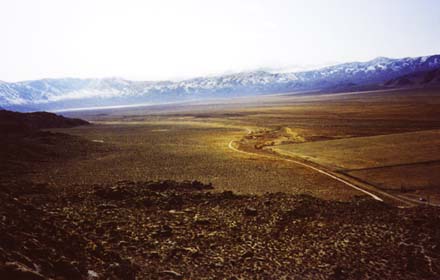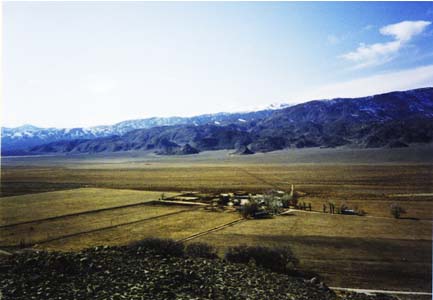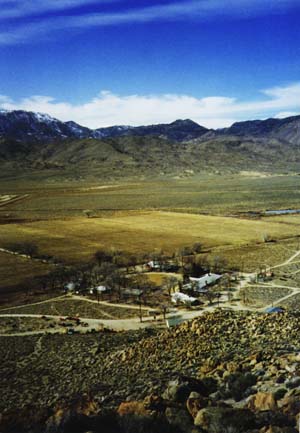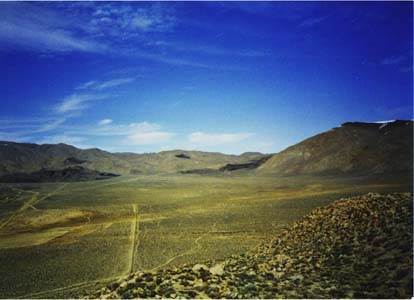[see also selection from the brochure]
 Deep Springs is a very small, very intense liberal arts college and working cattle ranch and alfalfa farm. Founded in 1917 by electrical pioneer and educational experimenter L.L. Nunn (Photo)
, the college is the only installation in a long, high-desert valley in eastern California, north-west of Las Vegas on highway 168. Focused by this isolation on the needs of their immediate community, students learn from the responsiblities of genuine self-government and from substantial physical labor, as well as the more traditional liberal arts curriculum.
Deep Springs is a very small, very intense liberal arts college and working cattle ranch and alfalfa farm. Founded in 1917 by electrical pioneer and educational experimenter L.L. Nunn (Photo)
, the college is the only installation in a long, high-desert valley in eastern California, north-west of Las Vegas on highway 168. Focused by this isolation on the needs of their immediate community, students learn from the responsiblities of genuine self-government and from substantial physical labor, as well as the more traditional liberal arts curriculum.
 The student body at Deep Springs is composed of roughly twenty-five male students of exceptional ability. Though the application's six essays are far more heavily weighted in admissions decisions than any test-scores, the mean SAT score has been consistently above 1300. Students pay no tuition or room and board fees. They typically have turned down offers of admission from institutions like Harvard, Columbia University, Cornell, Swarthmore, or Stanford. Deep Springs maintains a strong academic program, with a student-teacher ratio of roughly 4 to 1. Professors live 100 yards across a lawn from students and are readily available for guidance and advice on papers, academic life and plans, or things in general. A typical course has six students enrolled, who discuss topics with a professor in a seminar format.
The student body at Deep Springs is composed of roughly twenty-five male students of exceptional ability. Though the application's six essays are far more heavily weighted in admissions decisions than any test-scores, the mean SAT score has been consistently above 1300. Students pay no tuition or room and board fees. They typically have turned down offers of admission from institutions like Harvard, Columbia University, Cornell, Swarthmore, or Stanford. Deep Springs maintains a strong academic program, with a student-teacher ratio of roughly 4 to 1. Professors live 100 yards across a lawn from students and are readily available for guidance and advice on papers, academic life and plans, or things in general. A typical course has six students enrolled, who discuss topics with a professor in a seminar format.  The small size of the faculty -- the large student-faculty ratio notwithstanding -- leads many students to develop their own independent or directed studies. These are often connected with a topic of great interest to the faculty advisor, and have led to important research projects. The small size of the academic program has likewise led Deep Springs to conceive of itself as a unique alternative to the first two years in more conventional, four-year programs; though they have stayed for three and four years, students generally transfer after two years to schools of calibre equal or greater than those they had considered when coming out of high-school. The admissions officers at these schools know and respect the name of Deep Springs College.
The small size of the faculty -- the large student-faculty ratio notwithstanding -- leads many students to develop their own independent or directed studies. These are often connected with a topic of great interest to the faculty advisor, and have led to important research projects. The small size of the academic program has likewise led Deep Springs to conceive of itself as a unique alternative to the first two years in more conventional, four-year programs; though they have stayed for three and four years, students generally transfer after two years to schools of calibre equal or greater than those they had considered when coming out of high-school. The admissions officers at these schools know and respect the name of Deep Springs College.

Take a look here for more, nicer photos I took while there. Perhaps it was because I first learned to use a camera there -- I haven't taken pictures as interesting to me as these ones since I left the Deep Springs Valley.
To make electric contact:
Email Deep Springs Applications Committee for general questions about the college and questions about applying to become a student.
Email Deep Springs Curriculum Committee for specific questions about the college's curricular future and about applying for teaching postitions.
Email Deep Springs Communications Committee for press inquiries, to inquire about visits to the college or about any college publications
Write or call Deep Springs:
Deep Springs College
HC 72 Box 45001
Dyer NV 89010-9803 telephone 619 872 2000 fax 619 872 4466
Bishopweb, a commercial site with info on the Bishop, CA, the nearest town of any significant size to Deep Springs (45 minute drive).
Back to Rob's Pages
DETAILS ON DEEP SPRINGS COLLEGE
Maverick Colleges: Ten Notable Experiments in American Undergraduate Education
Princeton Review's Profile on DS
Princeton Review Rankings Page -- DS is pretty regularly in the top 5 of the important ranking categories.
Smithsonian Article, April 1995
McGuire on Deep Springs (with PHOTOS!)
Nunn's more broadly conceivedTelluride Association